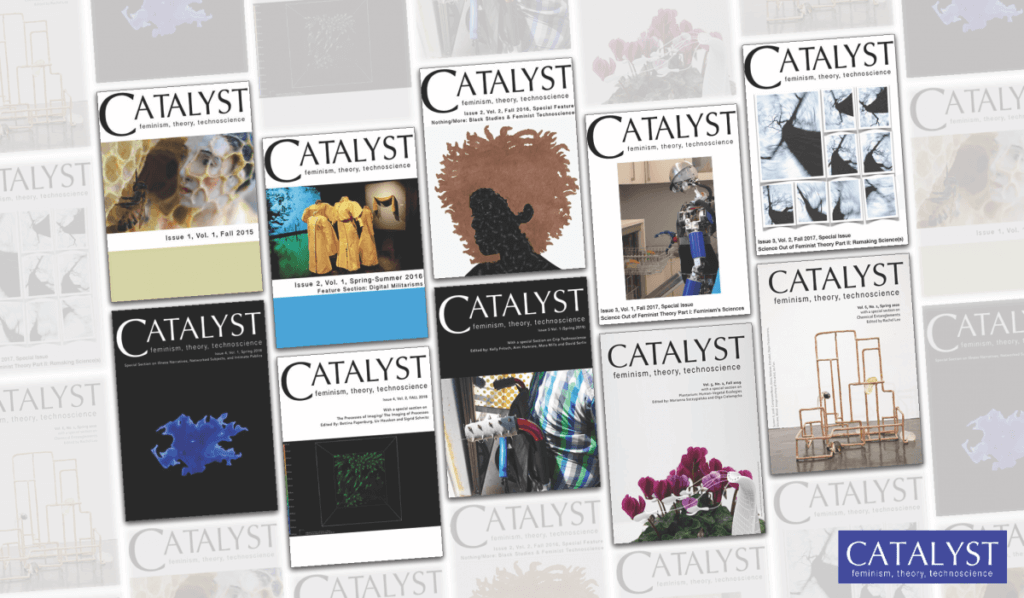
STS Infrastructure Award 2020: Catalyst: Feminism, Theory, Technoscience
The 4S 2020 STS Infrastructure Award Committee is delighted to announce that the recipients of this year’s Infrastructure Award are the editorial collective of the journal Catalyst: Feminism, Theory, Technoscience.
Catalyst is an interdisciplinary peer-reviewed online journal designed to serve the expanding field of feminist science and technology studies (STS). Now five years into publication, the journal has become an invaluable part of the infrastructure of the field. The decision of the committee was based on the outstanding work done by the Catalyst editorial collective in support of theoretically inventive and methodologically creative feminist scholarship that spans the social sciences, humanities, and arts.
The 2020 4S Infrastructure Award committee comprised Lucy Suchman, Chair; Wenhua Kuo, recipient 2018 Award on behalf of the journal East Asian Science, Technology and Society: an International Journal, and Bryn Seabrook, member of 4S Council.
Acceptance Statement
On behalf of all those who have poured their labor and love into conceiving, launching and building this feminist technoscience journal, the Editorial Board of Catalyst: Feminism, Theory, Technoscience is honored to accept the Infrastructure Award from 4S.Catalyst serves as a distinctive forum for both emerging and well-established scholars to publish interdisciplinary work. Catalyst aims to publish critically engaged feminist STS scholarship that reroutes the gendered, queer, raced, colonial, militarized, and political economic beings and doings of technoscience. We would like to thank all of those who have entrusted their precious work to this new journal. We would also like to thank our extraordinary community of peer reviewers, who have helped to develop the scholarship with remarkable insight and care.
The journal was first conceived in 2011 in a joint effort by Lisa Cartwright and David Serlin at UC San Diego and Deboleena Roy and Elizabeth Wilson at Emory University. Since that time many editors have contributed. The first lead editorial team was Lisa Cartwright and David Serlin. The second editorial team was Mara Mills and David Serlin. They were succeeded by the team of Patrick Keilty, Michelle Murphy, and Banu Subramaniam. They handed off the role to the current team, Nassim Parvin, Anne Pollock, and Deboleena Roy.
In addition to Original Research articles, Catalyst also features Special Sections, and Special Section editors have also played invaluable roles, working with Catalyst’s editors to curate special sections on wide-ranging themes:
Digital Militarisms (Lisa Cartwright)
Nothing/More: Black Studies and Feminist Technoscience (Cristina Visperas, Kimberly Juanita Brown, Jared Sexton)
Science Out of Feminist Theory Part 1: Feminism’s Sciences and Science Out of Feminist Theory Part 2: Remaking Science(s) (Banu Subramaniam and Angela Willey)
Illness Narratives, Networked Subjects (Beza Merid and Tamara Kneese)
The Processes of Imaging/The Imaging of Processes (Liv Hausken, Bettina Papenburg, Sigrid Schmitz)
Crip Technoscience (Kelly Fritsch, Aimi Hamraie, Mara Mills, David Serlin)
Plantarium: Human-Vegetal Ecologies (Marianna Szczygielska, Olga Cielemcka)
Chemical Entanglements (Rachel Lee)
We would especially like to thank our Managing Editors, graduate students who play key roles in the administration and production of the journal, many of whom are now our colleagues in feminist STS: Dayne Alexander, Louise Hickman, Poyao Huang, Monika S. Jones, Harris Kornstein, Yash Lara, Ingrid Meintjes, Rianka Singh, Nora Tataryan, Cristina Visperas, Caroline Warren, and Hannah Zeavin.
We have been fortunate to have received financial support from several institutional and organizational sponsors that provide multi-year funding for Catalyst’s research assistants, editorial assistance, and production costs. We are grateful to 4S for providing invaluable support at the start. Institutional sponsors ever since have included the Science Studies Program and the departments of Communication and Visual Arts at UC San Diego, the Technoscience Research Unit and Women & Gender Studies Institute at the University of Toronto, the Department of Media, Culture, and Communication at NYU, the departments of Women’s, Gender, and Sexuality Studies and Neuroscience and Behavioral Biology at Emory University, and the Digital Integrative Liberal Arts Center at Georgia Tech.
This year marks the 5th anniversary of the publication of Catalyst’s first issue, and we are proud of the journal’s contributions to feminist technoscience scholarship and are delighted to receive this recognition. We are committed to continuing to be a catalyzing component of this vital field!
Sincerely,
Catalyst Lead Editorial Team, for the Editorial Board
Kimberly Juanita Brown, Mount Holyoke
Lisa Cartwright, Professor, UCSD
Laura Foster, Indiana University, Bloomington
Aimi Hamraie, Vanderbilt
Patrick Keilty, University of Toronto
Rachel Lee, UCLA
Mara Mills, NYU
Michelle Murphy, University of Toronto
Nassim Parvin, Georgia Tech
Anne Pollock, King’s College London
Deboleena Roy, Emory University
David Serlin, UCSD
Banu Subramaniam, UMass Amherst
Sonja van Wichelen, University of Sydney
Kalindi Vora, UC Davis
2025: Digital STS
2024: Engaging Science, Technology, and Society (ESTS)
2023: Administrative and Editorial Pillars
2022: Administrative and Editorial Pillars of the Society and Field
2020: Catalyst: Feminism, Theory, Technoscience
2018: East Asian Science, Technology and Society: an International Journal (EASTS)
2017: Editors of the Handbooks of Science and Technology Studies
2016: WTMC (Netherlands Graduate Research School of Science, Technology and Modern Culture)

